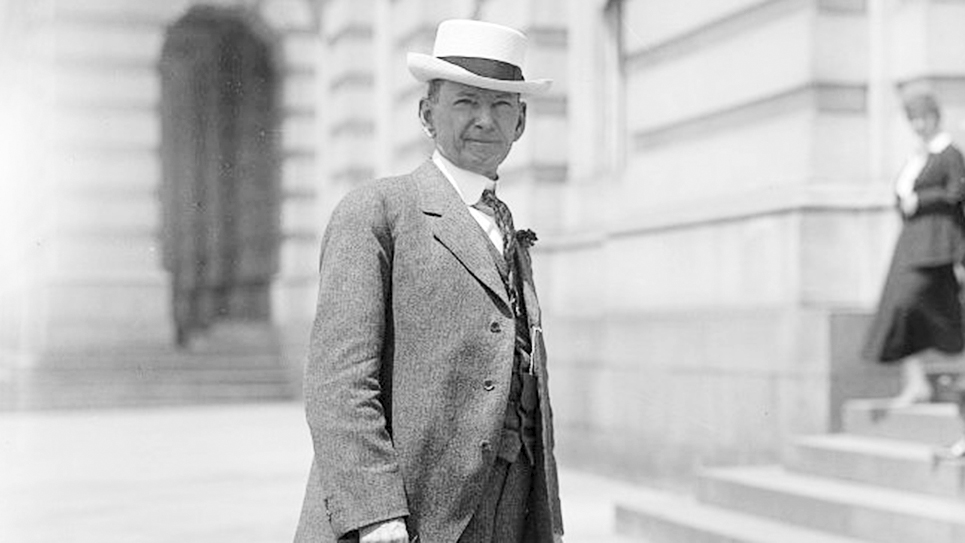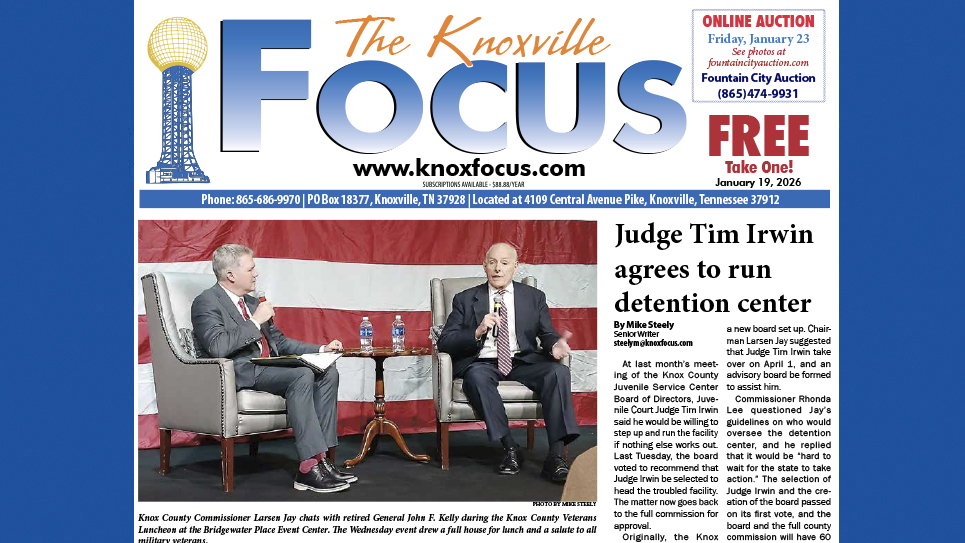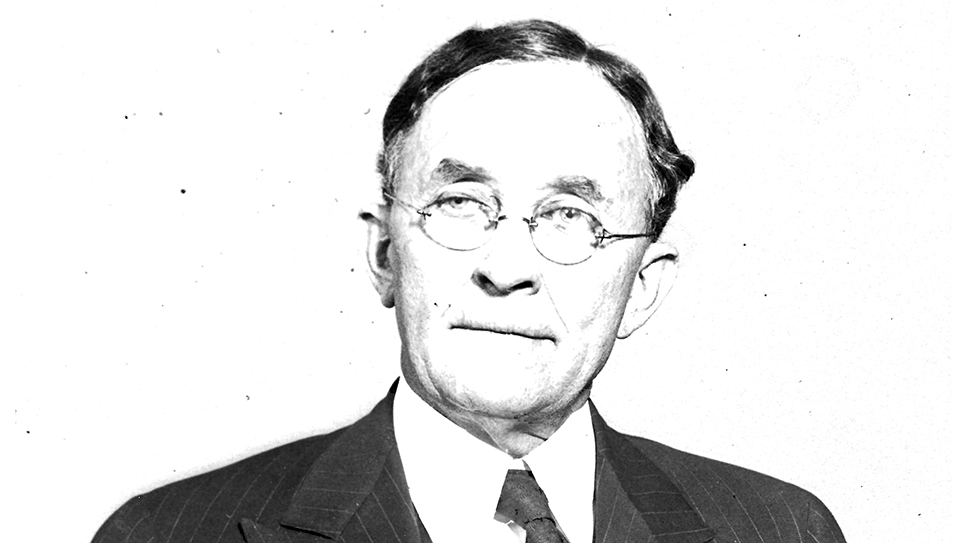Our Congressman
Richard W. Austin
By Ray Hill
For a decade, the congressman from Tennessee’s Second Congressional District was Richard W. Austin. Lean of frame, clean-shaven with piercing eyes and a bald pate, R. W. Austin counted his friends by the thousands. Indeed, when the former congressman died, the Knoxville Sentinel opined, “Dick Austin never deserted a friend, nor neglected an opportunity to help the deserving. He was gentle and kind.”
Born on August 26, 1857, in Decatur, Alabama, Richard W. Austin was sent by his parents to school in Loudon County, Tennessee. Austin went on to attend the University of Tennessee. Austin quickly became interested in politics and became a clerk at the post office through Congressman Leonidas C. Houk. Austin was a loyal supporter of the congressman, and his clerkship had been a reward for his faithful support. Eventually, fellow Republicans gathered together and put Dick Austin in charge of the Knoxville Chronicle, which was Knoxville’s Republican newspaper. Serving as an editor and the business manager of the news daily, Austin was called away by Congressman Houk, who asked him to work as his private secretary. That position would be more akin today to that of chief of staff. Houk appointed Austin as an assistant doorkeeper for the House Chamber. Everywhere he went, Dick Auston made new friends. Affable, courteous and thoughtful, Austin always made a good impression upon those whom he met.
When Congressman Leonidas Houk died suddenly after mistakenly drinking poison, Austin was one of the first to suggest that the congressional vacancy be filled by Houk’s son, John. John Houk was elected to the U.S. House of Representatives in 1892. When the congressman sought a second term in 1894, he called on Richard Austin to serve as his campaign manager once again. That year, John Houk encountered stiff opposition from Henry Gibson, who was a judge of the Knox County Chancery Court. The Houk faction was astonished when John lost the GOP nomination for Congress to Judge Gibson. The defeat was so shattering, it sent Richard Austin back to Alabama, where he practiced law in the city of his birth, Decatur. Austin’s interest in politics and government never abated, and he became the Republican nominee against Congressman Joseph Wheeler. “Fighting Joe” Wheeler was no mere congressman, having been a Confederate cavalry general during the Civil War and was very popular with his constituency. Dick Austin ran a game campaign but lost the election.
One wonders if Dick Austin decided to leave Alabama once again after realizing there was scant possibility of any kind of political future in the Yellowhammer State. By 1896, Austin had returned to Knoxville to work with Charles J. Allison on the presidential campaign of William McKinley, the GOP nominee. Allison was a cousin of the Ohio governor. Apparently, Austin’s hard work and political astuteness did not escape the attention of McKinley’s meticulous national campaign manager, Mark Hanna, nor that of the candidate himself. Once William McKinley defeated William Jennings Bryan, Richard W. Austin was designated to serve as U.S. Marshal for the Eastern District of Tennessee. When Dick Austin returned home to Knoxville with his commission as marshal in hand, he “was given an ovation and demonstration the like of which no other political appointee has received.” Awaiting him at the Southern Railway station were a delegation of Knoxville’s leading businessmen, a large delegation of Republicans and not a few Democrats, and a brass band. Seated in the lead automobile, Richard W. Austin was paraded up Gay Street.
Dick Austin continued to serve as U.S. Marshal until 1906, when President Theodore Roosevelt offered Austin the post as the U.S. Consul at Glasgow, Scotland. Austin accepted the offer with alacrity and set sail for Scotland. Although he enjoyed and was grateful for his post, Dick Austin disliked being away from the United States and still yearned for the opportunity to serve in Congress. Austin resigned as consul in 1907 and came back home to Knoxville.
Richard W. Austin promptly announced his candidacy for the U.S. House of Representatives in 1908. The incumbent was Nathan W. Hale. Austin ran a very aggressive campaign in an age before electronic and social media. Austin relied upon personal contact and coverage of the campaign by local newspapers. Austin upset Hale inside the Republican primary to become the GOP nominee. At least one Knoxville newspaper thought Austin’s primary victory was less a rejection of Hale than a personal recognition by the people of Tennessee’s Second Congressional District of Dick Austin.
Almost immediately, Dick Austin demonstrated his independence from the Republican leadership in the House, being the only GOP congressman to vote against the Payne Tariff Bill in 1909. When asked for an explanation of his vote, Austin replied, “My people sent me to Congress to conserve their interests, and I told them I would do my best. I could not, therefore, conscientiously vote to reduce the protection they now have on coal and iron and lumber. I am a Republican, and expect to remain one, but I’ve understood that protection was a cardinal doctrine of the party. This being true, I could not see my way clear to support a bill that is injurious to leading interests of the South, and of my own state in particular.”
When Austin sought reelection in 1910, he faced his predecessor once again inside the Republican primary. Nathan Hale sought to vindicate his previous loss and return to the House. Dick Austin carried every county in the Second Congressional District except for Jefferson, where Nathan Hale prevailed. When the election returns indicated Austin would beat former Congressman Hale, the incumbent readily acknowledged that while the primary campaign had been relatively short, it had also been “a very hard and strenuous one.”
Dick Austin had seemed to have entrenched himself as congressman from Tennessee’s Second District. Austin swept aside a challenge in the GOP primary by John Jennings, who was later elected to Congress in 1939. Austin had no primary opponents in the 1914 and 1916 elections.
In 1918, Austin faced the most formidable opponent in the Republican primary since he beat Congressman Nathan Hale a decade earlier. James Willis Taylor had been born in Union County and made his home in Campbell County, where he lived in LaFollette, where he had served as both postmaster and mayor. In 1913, Governor Ben W. Hooper appointed Taylor to serve as the Tennessee Commissioner of Insurance, a post he held until 1915. J. Will Taylor then became the chairman of Tennessee’s State Republican Executive Committee until 1918. Taylor was an expert gladhander, had a large acquaintanceship throughout the Second District, and was an able speaker. “Hillbilly Bill” Taylor set up his Knoxville headquarters in the Empire Building downtown.
Congressman Richard W. Austin was ailing, as he suffered from serious gallbladder trouble, yet was determined to keep his seat in the House. Austin made a formal announcement of his candidacy on June 15, 1918. With the United States engaged in the bloody First World War, Austin decided to remain at his own post of duty in Washington, D.C. Issuing a statement taking issue with Taylor’s criticism of his having been born in Alabama, Austin scoffed at “Hillbilly Bill’s” notion that he should be nominated as he was a native of Tennessee. “I was a resident and voter in the Second District before Mr. Taylor saw the light of day, and married in Tennessee the year after his birth,” Austin sniffed.
As to J. Will Taylor’s accusation that Austin had no home in the district, the congressman replied that he paid real estate taxes in Knoxville and had purchased four homes in Knox County. Austin said his family lived with him in Washington while Congress was in session, but that he and his family returned to Knoxville when the House was not in session. J. Will Taylor had also urged “rotation” in office, a notion he abandoned after being elected to Congress himself. As did every incumbent, Richard Austin pointed to his experience in office and seniority. Austin denounced Taylor as a “chronic office seeker.”
As would frequently be the case during his twenty years in Congress, Taylor’s honesty was challenged by his opponent. Congressman Austin noted that while Taylor had been postmaster of the LaFollette post office, it had been investigated “more times than any office in the state, on account of negligence, mistakes, shortage, irregularities … ” and the like.
Congressman Austin also pounded home J. Will Taylor’s declaration he had no bank account. While that was not uncommon in 1918, it would have been quite unusual for a person of Taylor’s stature to have no bank account of any kind. Austin charged that Taylor had told a post office inspector a decade earlier he “was worth $10,000” and “recently boasted that he had $10,000 in a LaFollette bank and $15,000 in a Knoxville bank.” That would be more than $750,000 today.
Tennessee at the time was a solidly Democratic state outside of the First and Second Congressional districts; with statewide office closed to Republican candidates, reaching Congress was about the highest aspiration for any Tennessee Republican, and the competition for the two congressional seats was frequently fierce. So, too, was the infighting for the lesser offices to be distributed when the Republicans occupied the White House and doled out the federal patronage. Dick Austin had never failed to take a side and had a bitter rivalry with his fellow congressman from Tennessee’s First District, Sam Sells. Congressman Sells did all he could to smooth the path for J. Will Taylor to remove Dick Austin from the House. Austin and Taylor met in at least two joint debates where new accusations were made, denied and hot words were flung at one another. Taylor charged Austin with being a disturbing influence inside Tennessee’s Republican Party. Evidently, a number of Republicans agreed with “Hillbilly Bill,” and Austin lost every county in the Second District except for Hamblen, which Austin won by 37 votes.
With defeat, Dick Austin looked to the future. Austin planned to practice law, forming a partnership with former Congressman William E. Humphrey of Washington State. The two attracted enough interest in their venture to estimate they would make more than twice what they had earned as congressmen. Austin eagerly anticipated beginning the new venture and returning to Knoxville, where he planned to open a local office. Austin’s plans were derailed by peritonitis, and although doctors were summoned, there was little they could do for the former congressman.
A parade of official Washington trooped to the congressman’s home to give their well-wishes for his speedy recovery. Among the callers was Senator John Shafroth of Colorado, who had engaged in a lively political tug-of-war over the question of independence for the Philippines. The two disagreed completely, but their disagreement did not affect their friendship. In fact, Senator Shafroth profoundly admired Dick Austin and, when told of the congressman’s death, his big frame shook with the sobs of his sorrow.
Even government clerks took a moment to call the Austin home to inquire about the congressman. Austin had once been a clerk himself and had always been known for his thoughtfulness and kindness to those working around him.
On a beautiful Easter morning in April 1919, Austin was surrounded by his family, his wife, son and daughter. Someone made mention of a topic in which the former congressman had an interest, and Austin smiled, closed his eyes and died.
Austin’s body was sent back to Knoxville from Washington, D.C., where he sleeps today.
© RAY HILL







